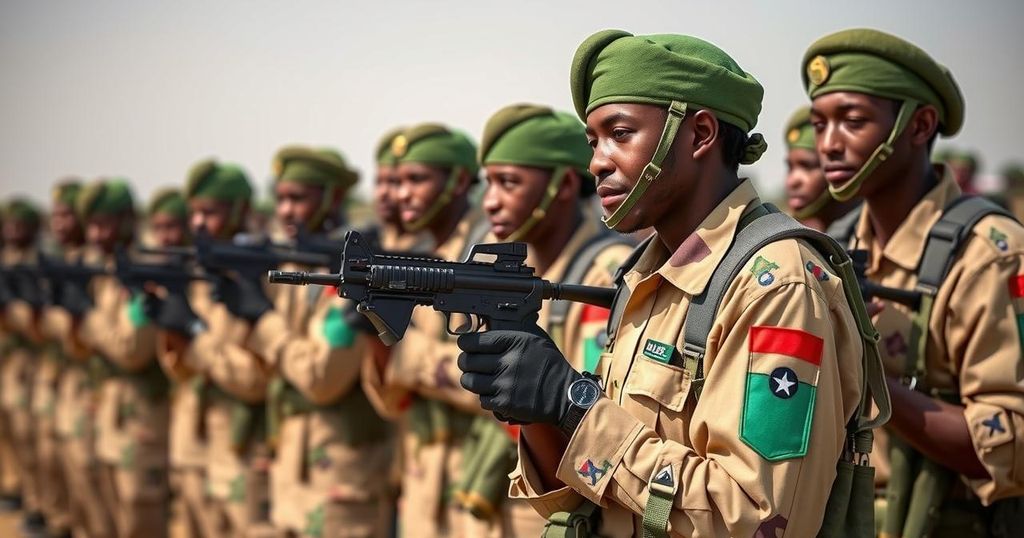Global news
AFRICA, BIDEN ADMINISTRATION, BRETT MCGURK, CHAD, CHRIS VAN HOLLEN, CONFLICT, DEMOCRATIC PARTY, DONALD TRUMP, HOUSE, HOUSE OF REPRESENTATIVES, HUMANITARIAN CRISIS, JOE BIDEN, MCGURK, MILITARY, NORTH AMERICA, SARA JACOBS, TRUMP, UAE, UNITED NATIONS, UNITED STATES, US, VAN HOLLEN, WASHINGTON, WHITE HOUSE
Fatima Khan
0 Comments
UAE Assures No Arms Transfers to Sudanese Paramilitaries Amid U.S. Concerns
The United Arab Emirates (UAE) has assured U.S. lawmakers that it will cease supplying arms to the Sudanese paramilitary group Rapid Support Forces (RSF). This pledge led lawmakers to abandon their efforts to block a significant arms deal worth $1.2 billion. Critically, the lawmakers- including Senators Chris Van Hollen and Sara Jacobs- expressed intentions to monitor the UAE’s compliance closely amid concerns over ongoing violence in Sudan’s civil war.
The United Arab Emirates (UAE) has informed United States lawmakers that it has halted the provision of weapons to paramilitaries engaged in Sudan’s violent civil conflict. This commitment comes in response to growing concerns from Washington and has resulted in lawmakers deciding to retract their legislative effort aimed at obstructing a $1.2 billion arms deal with the UAE. Senator Chris Van Hollen revealed that the UAE similarly issued assurances regarding its collaboration with Sudan’s Rapid Support Forces (RSF). In a letter from the White House signed by Middle East policy coordinator Brett McGurk, it was stated, “the UAE has informed the administration that it is not now transferring any weapons to the RSF and will not do so going forward.” McGurk also committed to delivering an assessment of the credibility of these assurances prior to January 17, shortly before the anticipated transition of the presidency.
Senator Van Hollen remarked that he had aimed to leverage arms sales to mitigate the ongoing violence in Sudan, emphasizing that failure to adhere to this promise could lead to renewed attempts to suspend the arms agreement. Similarly, Congresswoman Sara Jacobs, who spearheaded linked efforts in the House, indicated a commitment to vigilantly track the UAE’s compliance, highlighting, “Without the UAE’s support, the RSF will not have the same capabilities to wage this war, making negotiation and a ceasefire a much likelier alternative.” While the UAE has consistently refuted allegations of support to the RSF, previous UN reports have indicated credible claims regarding the channeling of arms to the RSF through Chad. The lawmakers were particularly focused on a major arms sale to the UAE that included advanced long-range missiles. Notably, the arms sales debate has been a recurring theme since the Trump administration promised substantial military equipment to the UAE in exchange for diplomatic recognition of Israel, a deal that faced renewed scrutiny under President Biden’s administration.
The context of this matter lies in the ongoing civil war in Sudan which has resulted in massive human suffering, including tens of thousands of deaths and the displacement of over 11 million citizens since April 2023. The RSF, a prominent actor in this conflict, has been accused of engaging in significant violence, prompting the international community, including U.S. lawmakers, to express deep concern regarding any external support, such as arms supplied by the UAE. The UAE’s denials of supporting RSF are juxtaposed with reports from United Nations experts who have expressed that allegations against the UAE regarding arms transfers are credible. The geopolitical dynamics of the region further complicate these discussions, particularly the arms deals which have become contentious issues in U.S. foreign policy since the Trump administration.
In conclusion, the UAE’s promise to cease arms transfers to the RSF represents a critical development in U.S.-UAE relations amid ongoing humanitarian crises in Sudan. The assurances provided by the UAE seek to address the serious concerns raised by U.S. lawmakers, who have expressed their intent to monitor compliance closely. This evolving situation underscores the complexities of international arms dealings and their impacts on conflict dynamics in regions fraught with violence.
Original Source: www.barrons.com




Post Comment